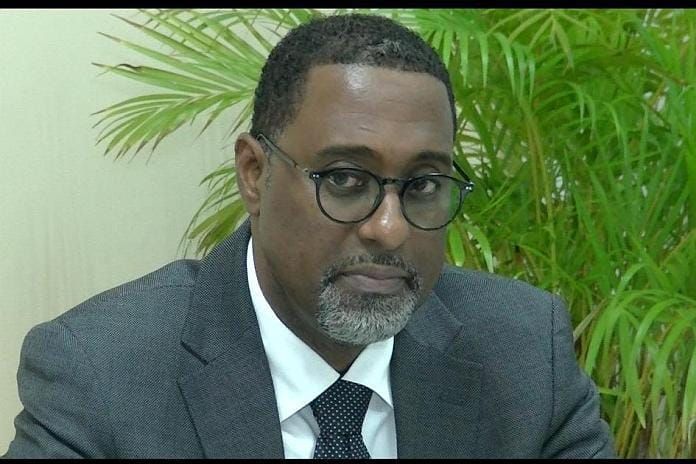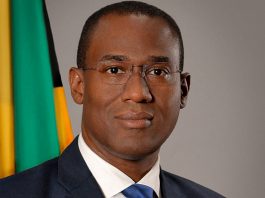
— Neoliberalism’s death drive
By Dr Alphonsus St Rose
The Paris Agreement of COP21 (December 2015) speaks to averting the irreversible effects of climate change by limiting global warming temperatures to no more than 1.5 degrees centigrade above the 1850 – 1900 (pre-industrial) times. A clear roadmap of global interventions to achieve the below 1.5 degrees Celsius (to stay alive) goal with targets of 45 percent reduction of carbon emissions by 2030 compared to 2010 levels, and net zero carbon emissions by 2050, was adopted (2015) and took effect in 2016. Limiting global warming will also require a reduction of methane emissions of 30 percent by 2030 from 2020 levels.
The limited success of that agreement, much like a failed Kyoto, is its emphasis on the demand side of the carbon equation as opposed to the supply side which nests the root cause of the climatic crisis. This frames a more holistic context for the “just energy transition” from dirty fossil fuel to net-zero carbon emissions in clean, sustainable, and renewable green energy. This is all critical to human survival as well as framing the decarbonized, digital and technology-driven global economies of today and tomorrow.
The UAE’s Sultan Ahmed al-Jaber, CEO of one of the world’s biggest oil firms, ADNOC, was the COP 28 President; a selection that, unlike Tony Blair’s welcome, was met with much outrage from global climate activists like Al Gore and Mary Robinson. Theresa Anderson, a climate justice advocate said, al-Jaber’s appointment, “goes beyond putting the fox in charge of the henhouse.” She continued: “The UN Climate Summit is supposed to be a space where the world holds polluters to account, but increasingly it is being hijacked by those with opposing interests. Like last year’s summit, we are increasingly seeing fossil fuel interests taking control of the process and shaping it to meet their own needs.”
The COP 28 represents nothing short of an almost three-decades-long battle (of fewer successes than failures) to avert a man-made global climate-induced catastrophe, omnicide. This is the world stage upon which ancient Greek mythology is in a very metaphorical sense, playing out. Thanatos (the Greek god of death) as in neoliberal capitalism and its resultant climatic crisis is evidently defeating Eros (the Greek god of love) as in our humanity, beauty, love, and preservation of civilization and the environment.
COP’s is a response phenomenon, driven principally by the existential threat the “climatic crisis” has posed to mankind and planet earth. Fossil fuel, is the linchpin of the climatic crisis. It is the dirty energy substrate that drives the industrialized wealth-producing platform in our dominant economic system of neoliberal capitalism.
Here, greed and profit maximization have unconscionably fuelled chimneys of chemical pollutants, namely CO2 and greenhouse gases, contaminating the atmosphere, which superheats the earth’s surface, melting the ice caps, raising sea levels, and causing a myriad of catastrophic weather patterns. These soon-to-be irreversible global climatic consequences are leading to debt-trapped economies, global wealth inequalities, poverty, social deprivation or dispossession, hunger, premature deaths, inevitable northbound mass-migratory exodus and conflicts.
One can therefore reasonably postulate, that the level of global poverty and social inequality is directly linked to the amount of global wealth generated from fossil-fuel-based industrialized economies. That correlation can also be measured by the quantity of CO2 emissions into the atmosphere.
The wealthy global north accounts for the highest carbon footprint and estimated 2030 global CO2 emissions are expected to be up by 12 percent more than in 2010. Rather than decarbonize economies to save humanity, fossil fuel production and consumption by the global north is now on steroids, super-carbonizing the atmosphere by driving economies to derive super profits.
Sadly, there are no encouraging signs of a collective willingness and genuine commitment by the wealthy industrialized Global North to negotiate a reset of its costly, extractive, political and economic agenda for the shared public good of mankind. They are yet to fulfil their pledged financial obligations of US$100 billion/year to the Climate Fund needed to protect the non-CO2 emitting impoverished countries and people of the global south. Indeed, a striking paradox in COP 28, hosted by a major petroleum and gas exporting nation, the UAE.
Here, the proponents of the “just energy transition” continue pleading (with the best available scientific data) to the wealthy elites and the global north (purveyors of the climatic crisis), to renege on what has made them ostentatiously wealthy for decades. A narrative that is anathema to neoliberal thinking. This stems from COP lacking a robust, directional, root-cause focus and honest climate leadership that is willing to unleash a necessary assault on fossil fuel.
Capitalism is known to live and thrive only where profitability exists and is therefore unwilling to devalue its fossil fuel-derived wealth or dismantle its carbon-driven wealth-generating platform as part of a decarbonized economy project to save humanity. The wealthy economic elites keep using their vast accumulation of wealth to acquire political power and influence decision-making to guarantee for themselves only, unrestrained wealth creation. This overarching economic interest is yet another paradox where lives get sacrificed at the altar of super profits.
As such, the Just Energy Transition must aim to dismantle the “global energy system” (of fossil fuels) which is foundational to the present extractive “global economic system” of neoliberalism. How we de-risk the just transition period from the resultant differential effects and new geopolitical shocks are challenges that will impact successful outcomes.
The science is clear and it has unequivocally demonstrated that the consumption of fossil fuel is the reason we have now entered the Anthropocene era. That has placed mankind and its diverse yet interdependent biosphere on an accelerated death drive. This trajectory connotes not just ethnocide or genocide but rather omnicide as we approach the 6th extinction; and this is with no measure of hyperbole.
This is the grim optics and reality, that greed, money, power, and influence have handed down on mankind to which there is but one viable, intelligent, and rational solution to save humanity, to completely suspend the entire life cycle of fossil fuel energy. Importantly, the availability, accessibility, affordability, and equity in renewable energy security is what will guarantee the success of a just energy transition. I can confidently posit that a failed “Green Energy Transition” will mean an unsuccessful outcome for the seventeen Sustainable Development Goals as well.
If the political economic system of global capitalism and its actors cannot save mankind and planet earth, then it is the moral responsibility of the international community of good conscience people to rise and agitate to save humanity. The Global South is a critical bloc that must unite in that fight. This is of even greater importance given the fact that Brazil will chair the G20 in 2024 while South Africa will hold the G20 chair in 2025. This must be for the global south, a pivotal moment of global opportunity and world leadership around climate justice, poverty, and global peace.
Already, COP 28 is happening and living through a sad and horrible humanitarian catastrophe in its backyard. A dispossessed Palestinian people, living in the world’s biggest open-air prison, (are) caught in an asymmetrical war, where 70 percent of the people murdered are innocent women and children. Where is global leadership and its humanity, its moral conscience?
What we see brewing, is a perverse sense of exceptionalism and supremacy, as well as the hubris and callous insensitivity of the there-gathered international community of world leaders to the genocide, barbarism and ethnic cleansing of the Palestinian people and their culture.
All this, and not a word of collective condemnation, except from a few individual quarters. This speaks to the pre-emptive mindset that awaits the dispossessed people of the Global South on their inevitable north-bound mass-migratory journey as migrants and refugees escaping the cruelty and ravages of the man-made climatic crisis and conflicts. The wealthy global north seems unwilling to share its dreams with the poor people of the global south who get demoralized, dehumanized, and disgraced with indignity for simply wanting to survive.
They too are human beings, endowed like any other, with universal rights that must be upheld, protected, and guaranteed by international humanitarian law and its signatory parties. Indeed, this has not panned out compassionately.
The South Pacific Island of Tuvalu is in the world’s richest fishing ground, and has 40 percent of its capital district under water at high tide. The tiny country is forecasted to be submerged in just a few decades and is in peril of losing its entire population and culture because of fossil fuel-induced climate change. Australia announced a humanitarian gesture at the APEC Summit in San Francisco, November 2023, to absorb the populace of Tuvalu considering its impending disappearance as a nation-state. Tuvalu is a microcosm of humanitarian tragedy soon to be escalated globally if we do not act with immediacy.
The way forward
The resolution of this global climatic crisis requires a global political solution where collective interest is marshalled into urgent collective action of an unprecedented pace and scale. It necessitates a foreign policy posture of mutual respect, equality, solidarity, and inclusivity around a framework of multilateralism. A multilateralism founded in cooperation, collective intelligence and collaboration among nation-states is the desirable vector to spread peace for shared global prosperity. Constitutionally, we must signal our embrace of multilateralism in the spirit, context, and framework of respect for international rights and laws as part of our foreign policy mission.
The political vision required to solve the climatic crisis must bring forth climate justice in an honest solution that is in character commensurate with the scale and scope of the problem. Fossil fuel production, consumption and emissions must be aligned to public policy that promotes and reflects a détente to stop the expansion of ongoing and new projects in line with the science, best practices, public welfare, and the objectives of the Paris Agreement.
It is this failure that has inspired the movement for a Fossil Fuel Non-Proliferation Treaty (FFNPT) Initiative that aims to place lives, livelihoods, and equity over profits. It creates an internationally binding mechanism of principles that frame a fair yet time-sensitive fossil fuel phase-out plan into a contract among nation-states.
The treaty must create a portfolio for jurisdictional power, to prosecute polluters and political leaders for their complicity, inaction, and acts of political negligence; also, for investor/state dispute settlements, as well as financing and subsidy matters. The commission on Small Island States on Climate Change and International Law must be strengthened with fairer access to due process. The treaty must carry regulatory and oversight mechanisms for good governance, transparency, and accountability.
Climate Action Policy pursuant to any treaty must include as well, a global registry of fossil fuel production for public access to data and information on businesses’ corporate transparency, as well as nation-state obligations. Climate Action on Loss and Damage Funding was birthed out of the increasing north/south pressures of global inequities related to the climatic crisis and its negative impact on executing an effective just energy transition. It must now be strengthened, prioritized, and escalated within a legal framework as another pillar of negotiating capital.
Acquiring access to adequate, affordable, long-term, low-interest concessionary climate finance is contingent on having a Climate Investment policy, climate action plan and strategy. Innovative tools like climate finance trackers can readily assist in producing a reliable data and monitoring platform of investment finance to inform policy and investment strategic decisions.
Climate action Finance (private & public) must be innovative and creative towards climate surveillance, mitigation, adaptation, and resilience building with ambitious planning and verifiable Targets. Debt cancellation for example, in exchange for climatic action should be robustly pursued with Multilateral Development Banks/Creditors.
It is imperative to establish a new global financial framework to access much-needed finance for critical global climate initiatives as posited in the Bridgetown Initiative. There is need for more robust regional affirmation towards financial solutions to include CARICOM, CELAC and Latin America (our closest ancestral and regional block). As a key part of that initiative our multilateral development institutions of the global south must leverage for greater integration, collaboration and access to concessionary financing on matters of shared regional solidarity and prosperity.
An enormous injection of finance and investment capital (trillions) at scale is now needed for sustainable and renewable green decarbonized economies. The transformation must include reforms towards clean and renewable transportation, digital infrastructure, clean electricity grids, green/blue renewable fishing, farming, food processing and the manufacturing industries through science and technology as well as projections in health and education. Debt pauses without a clear refinancing mechanism of long-term debt repayment are not acceptable options to assist the Global South.
They need to grow their economies, create decent jobs, attract investment, and free up much-needed funds for climate adaption and mitigation as well as the eradication of poverty, hunger, and inequality. To subject the Global South to interest rates of eight times the rates offered to the developed world is egregiously extractive, predatory, and parasitic. Mandatory capital and financial de-risking of investments cannot be the message of solidarity and hope for prosperity in the global south.
Additionally, the provision of special drawing rights, a creature of the MDB produces a monetary type inflation of prices and debt to borrowing countries that stifles their ability to equitably grow their economies. Accessing the special drawing rights has its inherent fault lines and equity challenges as well.
The funds allocated to the Special Drawing Rights Regime can be funnelled into a new climate fund that instead of being disbursed on a country-by-country basis is better served prioritizing the poorer countries regarding access to these funds over the richer countries. This is as equitable and fair an arrangement as can be.
After all, Ajay Banga said, we the people are the stakeholders and shareholders of the World Bank. As such, we deserve a more appropriate and proportional distributive mechanism that promotes equity and fairness to possibilities and opportunities; a change that is more reflective of a symbiotic partnership for fairer economic and social justice.
The Bretton Woods Institutions have failed in their global mission(s); they have enriched themselves and are now incapable of solving today’s global challenges because they lack the courage, moral conscience, and humanity to place lives over profits. It means the existing arrangement is morally, socially, and democratically unpalatable and therefore must be structurally adjusted towards a more benevolent and symbiotic partnership and relationship.
Air pollution is a public health hazard, crisis, and emergency whose biggest source contributor is fossil fuel. Therefore, replacing fossil fuel power with clean energy derived from renewable sources like wind, water or solar can significantly reduce carbon emissions, air pollution, respiratory diseases, and premature deaths. The just energy transition can only succeed if it projects the complete and unequivocal suspension of fossil fuel energy albeit in a time-phased approach rather than its unrestrained expansion.
From a public health perspective, the FFNPT must include a policy clause that prioritizes clean air as a necessary intervention and ESG tool for safe health and national wealth. These are the acts of omission and inaction that have resulted in the failure of Kyoto as well as placing in peril, the Paris Agreements. While there is a growing coalition of nations to attain net zero emissions, we are falling far short of what is needed by 2050.
The top five emitters China, USA, India, EU, and Russia, account for 60 percent of greenhouse gas emissions. The G20 account for 76 percent of global carbon emissions, the LDC’s for 3.8 percent and SIDS for less than 1%. Fossil fuels account for 86 percent of all carbon emissions responsible for the climatic crisis. Today, one in five people will die of premature death because of air pollution from fossil fuels.
Notwithstanding, greater efficiencies, urgency and innovative emphasis must still be placed on carbon removal, carbon capture and storage, green/blue bonds, green hydrogen, carbon off-sets and credits as part of a carbon negotiating tool-kit.
Science has told us that our existential threats are poverty, hunger, inequality, the climatic crisis, AI, and nuclear war. We need security and peace for socially conscious investment, job opportunities and growing our economy for shared prosperity and the common good of all global citizens.
That can only happen where the popular masses of everyday working people are engaged and mobilized in a meaningful social contract with their State “servant actors.” For that, social justice must prevail, and peace for progress must be the moonshot, on a mission to save mankind. Sadly, these critical issues are missing from our public educational and national dialogue. We need greater public ownership and state leadership to guide critical investments towards a cleaner and technologically driven social economy.



